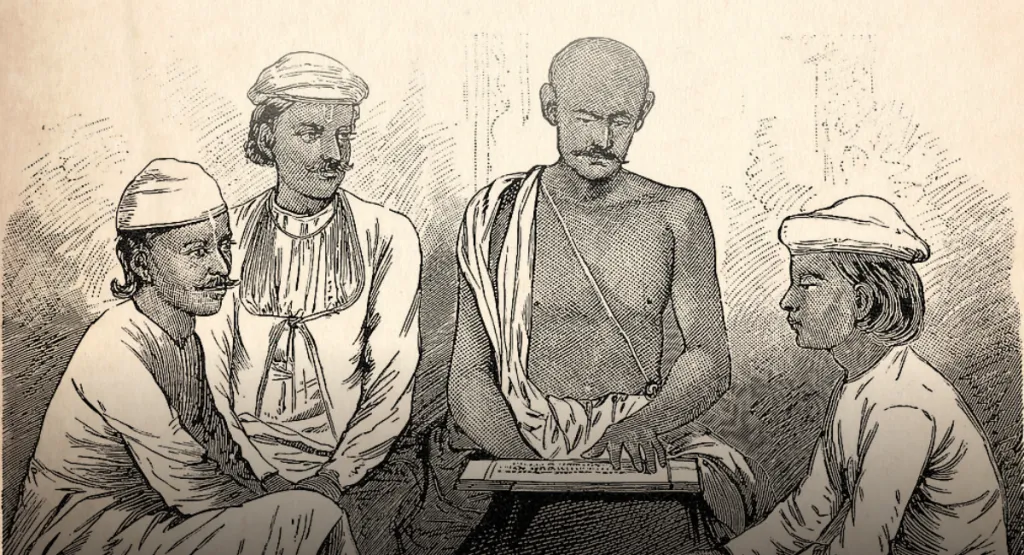Indian philosophy has profoundly shaped global thought, influencing cultures and disciplines worldwide. Rooted in ancient texts and traditions, it offers insights into life, consciousness, and the universe that resonate far beyond India’s borders.
A Gateway to Eastern Wisdom

The world’s fascination with Indian philosophy began centuries ago. Scholars and thinkers across the globe studied texts like the Vedas, Upanishads, and Bhagavad Gita. These works introduced ideas such as dharma (duty), karma (action and consequence), and moksha (liberation) to a global audience. They offered a new way to understand existence.
Impact on Western Thought
Indian philosophy has significantly influenced Western thinkers. For instance, German philosopher Arthur Schopenhauer praised the Upanishads as “the solace of his life and death.” The transcendentalist movement in the United States, led by Ralph Waldo Emerson and Henry David Thoreau, was deeply inspired by Indian spiritual teachings. Their works reflect themes of self-reliance and the unity of all life, echoing ideas found in Hinduism and Buddhism.
Shaping Modern Spirituality
In the 20th century, figures like Mahatma Gandhi and Swami Vivekananda continued to spread Indian philosophy. Gandhi’s principles of nonviolence (ahimsa) and truth (satya) drew from Jainism and Hinduism, influencing civil rights movements worldwide. Vivekananda’s speeches at the Parliament of the World’s Religions in 1893 introduced Vedanta and yoga to the West. His ideas sparked interest in meditation and spiritual practices that promote inner peace and self-awareness.
Yoga and Meditation
Yoga and meditation are now global phenomena. Originating in ancient India, these practices are embraced worldwide for their physical, mental, and spiritual benefits. Yoga has become a multi-billion-dollar industry, with millions practicing it daily.
Eastern Philosophical Thought in Modern Science
Modern science has also drawn from Indian philosophy. Quantum physicists like Fritjof Capra have found parallels between quantum mechanics and Indian metaphysical concepts.
Conclusion
Indian philosophy has left an indelible mark on global thought. It has shaped Western intellectual traditions, guided modern spiritual practices, and influenced scientific inquiries. As the world seeks wisdom in an age of uncertainty, Indian philosophy continues to offer profound insights and universal truths.


29 comments
Good day! Do you know if they make any plugins to assist with SEO?
I’m trying to get my website to rank for some
targeted keywords but I’m not seeing very good success.
If you know of any please share. Many thanks! I saw similar
article here: Eco wool
I don’t think the title of your article matches the content lol. Just kidding, mainly because I had some doubts after reading the article.
I don’t think the title of your article matches the content lol. Just kidding, mainly because I had some doubts after reading the article.
Vibracion mecanica
Sistemas de balanceo: importante para el funcionamiento fluido y productivo de las dispositivos.
En el mundo de la avances actual, donde la rendimiento y la estabilidad del sistema son de gran trascendencia, los sistemas de calibración desempeñan un función crucial. Estos aparatos específicos están diseñados para calibrar y estabilizar componentes dinámicas, ya sea en equipamiento industrial, transportes de desplazamiento o incluso en dispositivos de uso diario.
Para los profesionales en soporte de dispositivos y los ingenieros, utilizar con dispositivos de calibración es fundamental para asegurar el funcionamiento estable y confiable de cualquier mecanismo giratorio. Gracias a estas herramientas tecnológicas sofisticadas, es posible limitar considerablemente las movimientos, el ruido y la presión sobre los rodamientos, mejorando la tiempo de servicio de elementos costosos.
También relevante es el papel que cumplen los sistemas de ajuste en la atención al comprador. El ayuda profesional y el reparación constante utilizando estos dispositivos habilitan brindar prestaciones de óptima nivel, mejorando la agrado de los usuarios.
Para los propietarios de emprendimientos, la contribución en sistemas de calibración y dispositivos puede ser fundamental para optimizar la efectividad y eficiencia de sus sistemas. Esto es especialmente relevante para los dueños de negocios que administran pequeñas y medianas organizaciones, donde cada punto cuenta.
Asimismo, los dispositivos de ajuste tienen una gran implementación en el campo de la seguridad y el supervisión de calidad. Habilitan encontrar potenciales problemas, impidiendo arreglos caras y averías a los equipos. Incluso, los datos extraídos de estos aparatos pueden aplicarse para perfeccionar procesos y potenciar la presencia en sistemas de investigación.
Las campos de implementación de los aparatos de ajuste abarcan variadas sectores, desde la manufactura de ciclos hasta el supervisión de la naturaleza. No influye si se refiere de grandes elaboraciones productivas o modestos espacios caseros, los sistemas de equilibrado son fundamentales para promover un desempeño óptimo y sin fallos.
sildenafil amazon
canadian pharmaceuticals for usa sales
prescription price comparison
female viagra
on line pharmacy with no prescriptions
buy meds online
online canadian pharmacies
legitimate canadian mail order pharmacies
how to buy cialis
discount drugs online pharmacy
sildenafil citrate tablets
best prescription prices
canada meds
viagra from india
I like the helpful information you provide in your articles. I will bookmark your blog and check again here frequently. I’m quite certain I will learn plenty of new stuff right here! Good luck for the next!
Appreciating the time and energy you put into your blog and in depth information you offer. It’s awesome to come across a blog every once in a while that isn’t the same old rehashed information. Excellent read! I’ve saved your site and I’m adding your RSS feeds to my Google account.
goodrx viagra
Thank you for your sharing. I am worried that I lack creative ideas. It is your article that makes me full of hope. Thank you. But, I have a question, can you help me?
В обзорной статье вы найдете собрание важных фактов и аналитики по самым разнообразным темам. Мы рассматриваем как современные исследования, так и исторические контексты, чтобы вы могли получить полное представление о предмете. Погрузитесь в мир знаний и сделайте шаг к пониманию!
Подробнее можно узнать тут – https://medalkoblog.ru/
mexican online pharmacies
canadian medication
pharmacy cost comparison
canadian pharmacies online reviews
canadian world pharmacy
prescription cost comparison